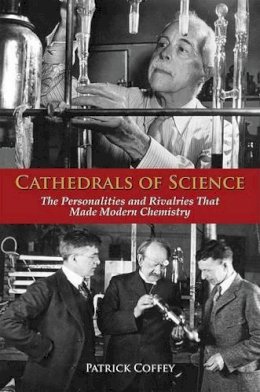
Stock image for illustration purposes only - book cover, edition or condition may vary.
Cathedrals of Science: The Personalities and Rivalries That Made Modern Chemistry
Patrick Coffey
€ 70.14
FREE Delivery in Ireland
Description for Cathedrals of Science: The Personalities and Rivalries That Made Modern Chemistry
Hardback. Like any other human endeavor, chemistry was built by real people, with all their strengths and faults. Cathedrals of Science describes its construction-the intersection of science and personality that transformed chemistry, with its chemists struggling for understanding, squabbling over scientific credit, and making moral choices about chemical warfare, totalitarianism, and nuclear weapons. Num Pages: 400 pages, 26 black and white halftones, 31 line illustrations. BIC Classification: 3JH; 3JJ; PDX; PN. Category: (G) General (US: Trade); (UU) Undergraduate. Dimension: 235 x 160 x 26. Weight in Grams: 694.
In Cathedrals of Science, Patrick Coffey describes how chemistry got its modern footing-how thirteen brilliant men and one woman struggled with the laws of the universe and with each other. They wanted to discover how the world worked, but they also wanted credit for making those discoveries, and their personalities often affected how that credit was assigned. Gilbert Lewis, for example, could be reclusive and resentful, and his enmity with Walther Nernst may have cost him the Nobel Prize; Irving Langmuir, gregarious and charming, "rediscovered" Lewis's theory of the chemical bond and received much of the credit for it. Langmuir's personality smoothed his path to the Nobel Prize over Lewis. Coffey deals with moral and societal issues as well. These same scientists were the first to be seen by their countries as military assets. Fritz Haber, dubbed the "father of chemical warfare," pioneered the use of poison gas in World War I-vividly described-and Glenn Seaborg and Harold Urey were leaders in World War II's Manhattan Project; Urey and Linus Pauling worked for nuclear disarmament after the war. Science was not always fair, and many were excluded. The Nazis pushed Jewish scientists like Haber from their posts in the 1930s. Anti-Semitism was also a force in American chemistry, and few women were allowed in; Pauling, for example, used his influence to cut off the funding and block the publications of his rival, Dorothy Wrinch. Cathedrals of Science paints a colorful portrait of the building of modern chemistry from the late 19th to the mid-20th century.
Product Details
Publisher
Oxford University Press Inc United States
Number of pages
416
Format
Hardback
Publication date
2008
Condition
New
Weight
707g
Number of Pages
400
Place of Publication
New York, United States
ISBN
9780195321340
SKU
V9780195321340
Shipping Time
Usually ships in 15 to 20 working days
Ref
99-7
About Patrick Coffey
Coffey spent most of his career in the design of instruments for chemical research and was a co-founder of a number of scientific instrument companies. In 2003, he began research into the history of chemistry at the University of California, Berkeley.
Reviews for Cathedrals of Science: The Personalities and Rivalries That Made Modern Chemistry
Coffey aims at unveiling how different personal characteristics led to differences in scientific styles. How friendships, camaraderie, enmities and rivalries played a role in shaping developments in science, in strengthening scientific and social networks, in articulation of research groups, in the establishment of codes of conduct between senior researchers and young students, and in responding to various political context, often extreme as in the case of the two world wars. Definitely, it is when discussing how conflicts of personalitites and controversies over scientific matters shape the real world of physical chemistry, that the author excels.
Metascience
... a gripping page-turning narrative that elegantly combines popular science with a serious history of science.
Chemistry World
Metascience
... a gripping page-turning narrative that elegantly combines popular science with a serious history of science.
Chemistry World
